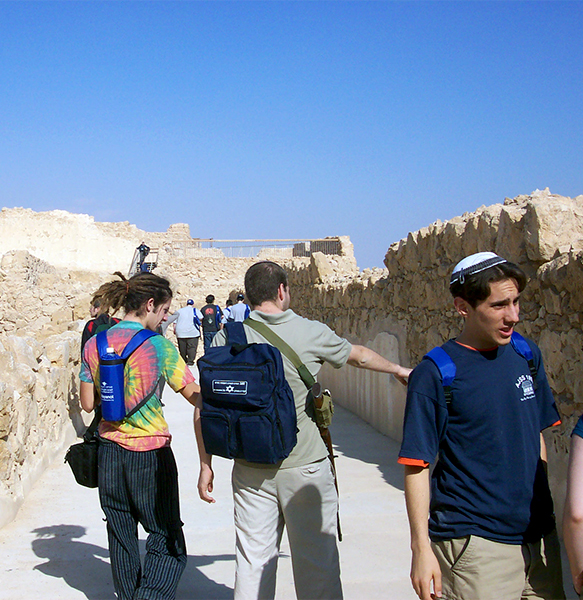
Birthright Israel visitors explore Masada, an ancient fortress in the Southern District of Israel, during their 10-day trip in 2003.
I admit it: I love the comedy series “Broad City.”
I find the misadventures of Ilana Wexler (played by Ilana Glazer) and Abbi Abrams (played by Abbi Jacobson) to be very funny.
Ilana and Abbi are two young women in their early twenties — socially adventurous, employed but not living up to their potential, and deeply Jewish. Lana’s parents are played by Susie Essman and Bob Balaban; can you get more Jewish?
Except: during the last few episodes, I stopped laughing.
Ilana and Abbi take advantage of the opportunity to go on “Birthmark” (a.k.a. Birthright — get it?) — an all expense paid trip to Israel for young people. The adventure begins with a wacky, roundabout trip to the airport, and when they get there, they undergo a quick orientation to the trip and its dominant ethos.
Which is: everyone on the trip is supposed to hook up with each other, and to create Jewish relationships, and ultimately to have Jewish babies.
One young man announces his engagement to a young woman whom he has just met. He presents her with the engagement ring that he had packed in his luggage — in obvious anticipation of just such a possibility.
So, the writers of this episode “get” it. Perhaps that is the real subtext of Birthright.
Yes, the organizers want the participants to meet Israel, but they also want them to meet each other. Next step: the wedding canopy and, eventually, a Lamaze class at a JCC.
If that is truly Birthright’s not-so-hidden agenda, it seems to be working. There is evidence that Birthright participants are more likely to marry other Jews — even if the future mate was not on the same Birthright trip
If that turns out to be the takeaway from Birthright, as we would have said on Passover last week — dayeinu — it would be enough.
Here is why. This week, we are marking Yom HaShoah — Holocaust Remembrance Day.
We lost 1.5 million Jewish children.
So, yes — I welcome Jews having Jewish children.
And I do not apologize for that.
So, on the plane to Israel, Ilana, the more sexually adventurous of the duo, announces that she wants to join what she calls the Mohel Chai Club. After she consummates her wish in the airplane, she promises the group leader, who has been the lucky beneficiary of her fantasy, that she won’t “Tel Aviv.”
To which he responds, in a slight panic: “You know Aviv?”
Cute.
Here comes the unfunny part.
Ilana tells an increasingly nauseous Abbi about mohalim (Jewish ritual circumcisers) who, ahem, apply their lips to the wounds of eight day infants, and then suck the blood of the infants. Ilana refers to it as “sucking baby ________.”
She is referring to metzitzah b’peh. In this controversial practice, the mohel orally sutures the circumcision wound. The practice has fallen into disrepute among most mohalim, especially after several incidents in which mohalim inadvertently infected infants with herpes.
So, what didn’t I like about these episodes of “Broad City”?
First, there was the ridicule of Birthright.
Normally, I would not be concerned.
But nowadays, I am.
Anti-Israeli and anti-Zionist activity on college campuses is growing. It is realistic to imagine that there will be increased pressure on Jewish kids to not go on Birthright — and even worse — perhaps even ostracism of those who do go. There is already anti-Birthright agitation on some campuses. And, for some reason, the Forward decided to publish a piece that tied this episode to an anti-Israel narrative.
More than that: the scene plays into the stereotype of Jews as being clannish and tribal. Jewish kids chanting “Jews, Jews, Jews”?
Give me a break.
And the group leader gets a commission for every match that happens on his program? Can we just cue the “money grubbing Jew” music?
What about the bit about the orality of circumcision?
A flashback.
Philip Roth is, arguably, American Jewry’s greatest writer. Years ago, his books “Goodbye Columbus” and “Portnoy’s Complaint” were controversial. He put Jewish foibles and libido on full display.
To paraphrase one of Roth’s later characters, it was as if Roth had written material that would have “warmed the heart of Julius Stretcher [a major Nazi propagandist] or Joseph Goebbels.”
Roth was laughing at those who were upset by his sardonic view of middle-class American Judaism — laughing at their paranoia and their overstatement of their concerns.
But “Broad City” airs in the context of growing anti-Israelism and anti-semitism, in which the borders between the two are increasingly sketchy.
Drawing attention to one of the least pleasant aspects of Judaism’s holiest ritual — circumcision — wasn’t funny; it was disgusting. It subconsciously played on anti-Semitic stereotypes: the Jews as sexually lascivious, and as vampires who thirst for blood.
When it comes to a sense of humor and absurdity, mine is as robust as anyone’s.
The current episodes expose Jews and Judaism to a level of mockery that will (to use our grandparents’ phrase) not be good for the Jews.
But, as we consider the context of increased Jew hatred in the world today, we are not only allowed to be uncomfortable with “Broad City.”
It might actually be necessary.
Ilana and Abbi: I still love you, but please clean up your act.






